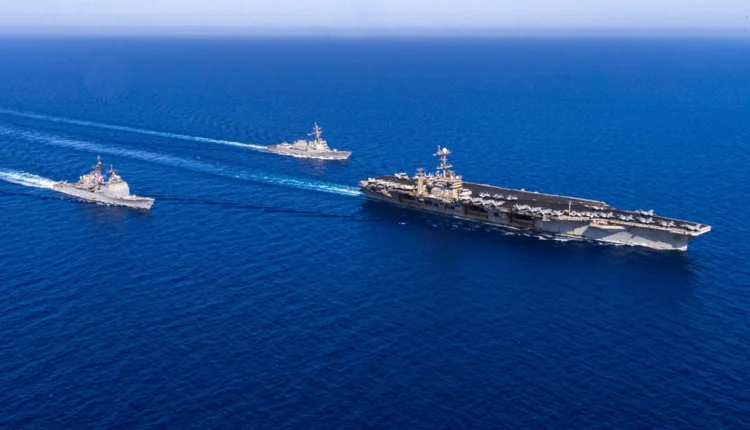A Hebrew report reveals: One Yemeni missile forced Trump to halt aggression against Yemen and shook the U.S. Navy’s prestige
Follow-ups – Al-Khabar Al-Yemeni:
The Hebrew website Calcalist reported that US President Donald Trump was compelled to stop the American-British air campaign against Yemen in May 2025 due to what the report described as “hidden reasons,” primarily a single Yemeni missile launched by Sana’a forces towards the American aircraft carrier “Harry Truman,” which nearly struck it, causing panic in the Pentagon and leading to the cessation of operations out of fear of a strategic and military disaster that could embarrass Washington both domestically and internationally.
In an extensive report published by the Hebrew newspaper, prepared by journalist “Nitzan Sadan,” documented the details of what he called “the night Trump was afraid,” revealing that the “Rough Rider” campaign launched by Washington and London against northern Yemen failed, not only for field reasons but also because the Yemeni army—as he described—demonstrated a missile deterrence capability that made the US Navy completely reconsider its calculations.
According to the report, President Trump announced the halt of bombings on May 5, claiming that “the Houthis requested a truce,” but the truth, as revealed by the report, was that the Pentagon warned the president that any direct targeting of an American ship, especially the “Harry Truman” aircraft carrier, would be a strategic and media disaster, potentially forcing Washington into a ground invasion of northern Yemen, which the American leadership does not want at any cost.
In a detailed account of what transpired, the report revealed that Sana’a forces launched a precision ballistic missile towards the “Truman” on the night of April 28 after pinpointing its location through accurate intelligence—possibly from Russian or Iranian sources, as stated—and bombarded the maritime path with a series of missiles and drones in a compound attack that confused U.S. defense systems.
Although the missile did not directly hit its target, the giant aircraft carrier was forced to execute sharp evasive maneuvers, reaching a tilt of 20 degrees, which caused an F-18 fighter jet to slide off the carrier’s deck and fall into the sea, a plane valued at $70 million. A US Navy officer confirmed that the ship’s deck had to tilt during the maneuver to the extent that the aircraft detached from its securing ropes and flew toward the water.
The report highlighted that the launched missile has a range of less than 300 kilometers, flies on a steep downward path, and reaches speeds exceeding the speed of sound, which makes intercepting it an almost impossible task. Its warhead weighs 650 kg and is considered one of the most dangerous missiles that Sana’a currently has in its naval arsenal.
The report described this type of missile as the “joker” in the Ansar Allah arsenal, noting that it differs from drones or cruise missiles in terms of flight, tracking, and targeting, posing an exceptional threat to American aircraft carriers. The website acknowledged that the US Navy’s defenses failed to fully intercept the missile, especially given the complexity of the attack and its coincidence with waves of drones.
The report confirmed that Washington realized that night the magnitude of the gap between gains and losses, and Trump feared that continuing the operation would result in a catastrophic image showing a burning American aircraft carrier being towed to a nearby port, which would embarrass America in the eyes of the world and bring down the image of the “iron president” that Trump seeks to market before the elections.
Faced with this scenario, the report stated, the president’s team became convinced that “the Houthis” must be dealt with politically rather than militarily and that the cost would be exorbitant if strikes continued, especially after Sana’a demonstrated that it possessed advanced systems capable of threatening the greatest US naval vessels.
The report also indicated that Yemeni armed forces, despite halting attacks on American ships since May, have not stopped targeting vessels linked to the Zionist entity, and that their operations continue to escalate.
In an implicit acknowledgment of Sana’a’s strength, the website stated that “the Houthis are barefoot but clever,” and that they succeeded in making the world appear confused before them, despite everyone believing they were merely a “group,” noting that Washington and Tel Aviv failed to prevent them from threatening maritime corridors, and that Yemeni missiles continue to intimidate ships despite not hitting directly.
Thus, the Hebrew media acknowledges that the “Rough Rider” operation did not stop due to American desire or agreements, but rather due to a single Yemeni missile strike that changed the rules of engagement, shattered the prestige of American power at sea, and proved that Yemen is no longer that easy country whose cities are bombed from the air without a response, but rather has become a difficult number in the equation of the region, holding the reins of the sea and advancing with a compass that does not deviate from Jerusalem.

